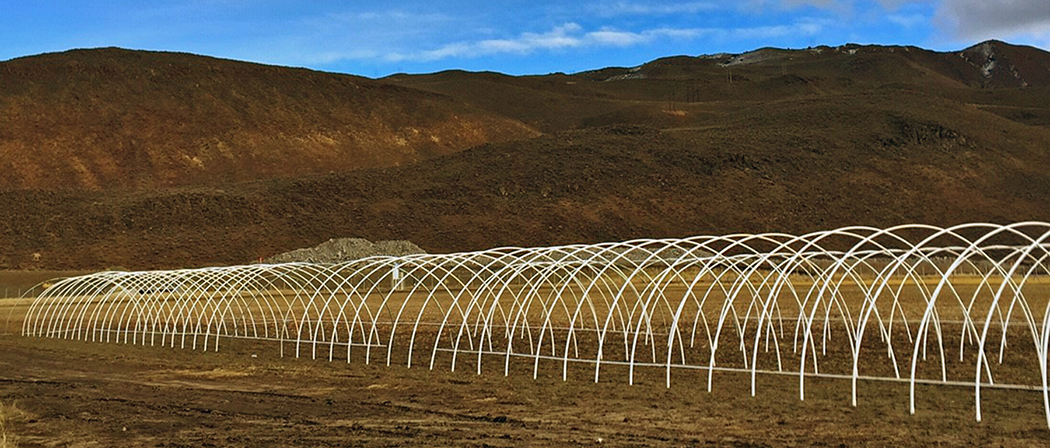More than 30 volunteers and University of Nevada, Reno staff and students spent a sunny, yet windy, winter day last week building six hoop houses that will be used to grow vegetables year-round to benefit Catholic Charities of Northern Nevada food programs.
The workers erected the framework for the hoop houses on the east side of the University's 900-acre Main Station Field Lab in east Reno, one of several outdoor laboratories throughout the state that are part of the Nevada Agricultural Experiment Station.
"It was a successful day - we had students, volunteers from the Catholic Charities' Crossroads program and community volunteers come together for a great project," Jennifer Ott, director of the Desert Farming Initiative said. "It was pretty easy building, the toughest part was the wind and the mud."
The design is simple, built of reinforcing bar, metal and plastic pipe supports and canvas coverings.
Each hoop house is 8 feet high, 16 feet wide and 96 feet long. The project could glean as much as 500 pounds a week of fruits and vegetables in the summer season.
"The whole building experience was really great," Yvette Myers, pantry director at Catholic Charities, said. "Everyone was really excited and I've gotten positive feedback already from volunteers who want to find out when they can come out and help some more. We are very excited about the completion of the hoop houses and the next steps."
The group isn't waiting long for the next steps.
"In April we plan to put the 'skins,' the coverings, on the framework and begin planting crops once they are up," Ott said. "With these six hoop houses we expect to harvest 200 pounds of lettuce a week, year round, plus a variety of other vegetables."
Sustainable year-round production of fresh vegetables will highlight the benefits of growing your own food and healthy eating. It also fits the farming initiative's mission of demonstrating the ease and simplicity of construction and economic benefits of this type of structure.
"We do what we do well, growing, planting, harvesting," Ott said. "And Catholic Charities will distribute the produce with their programs throughout the community. Thousands of people will receive this food in their meals. It's a mutually beneficial partnership, using both of our strengths to benefit the community."
The new hoop houses augment the four hoop houses at the Nevada Agricultural Experiment Station's Valley Road facility in Reno. This is an important step for the program, as the director of the agricultural station and dean of CABNR looks to expand this program to communities throughout the state. Plus, the new structures will allow for increased consistency and a greater volume of fresh produce for low income clients of St. Vincent's, a population that rarely has access to these types of foods.
"This year is our 75th anniversary of serving the community," Peter Vogel, CEO of Catholic Charities said. "This huge effort helps us establish even deeper roots and is a step to an even bigger picture and long-term benefits for the community."
The new partnership follows an already established relationship between the two groups. The Farming Initiative has been donating all of their extra produce to St. Vincent's Food Pantry and St. Vincent's Dining Room since their first harvest in 2013.
The farming initiative is a joint program between the College of Agriculture, Biotechnology and Natural Resources, Nevada Agricultural Experiment Station, University of Nevada Cooperative Extension and the College of Business. Increased investment in the Initiative is part of a larger effort by CABNR, NAES and Cooperative Extension to promote healthy lifestyles that include increased consumption of fresh vegetables.
"It's wonderful to see our vision of utilizing more of the Main Station Field Lab for research, outreach and teaching starting to take hold in exciting and useful new ways," Marc Johnson, president of the University said. "(CABNR) Dean Bill Payne is leading a transformation of the college that is not only engaging, collaborative and world-leading, but also makes a difference right here at home."












